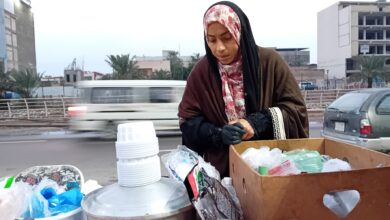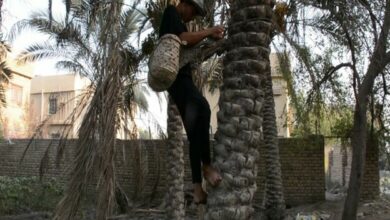FEMALE STREETFOOD VENDOR: ‘Chickpeas made me an independent woman’

By Mustafa Jamal Murad, in Baghdad. Early every morning, locals using the Al Nahda bus terminal in the center of the Iraqi capital, Baghdad, will see Um Ayman as she stands behind her cart selling the traditional Iraqi dish, lablabi, a chickpea broth that’s served with different flavourings, depending on where in Iraq you’re eating it.
There are lablabi carts in most Iraqi cities, among all the other vendors selling street food. But it’s rare to find a woman among them.
Um Ayman, 40, has been selling lablabi here in the bus terminal for the past decade. She started the job because she had to provide for her son after her husband died.
“When I decided to work here, I didn’t care about what my neighbors and relatives told me about the dangers of working in a public bus terminal, a place surrounded by men,” Um Ayman says, while filling a plate with chickpeas for a local taxi driver. “In a short period of time I was able to gain everyone’s trust and respect.”
She sees it as a suitable profession. “No one is responsible for me and I am not responsible for anyone,” she explains. “Anyway my family responsibilities do not really allow me to learn a new profession.”
And she proudly recounts how opinions of her work have changed over time, going from complete disapproval to encouragement and support. “Not only my relatives, but all the drivers and workers in this garage around me have become my supportive brothers and friends,” she says.
Having said that, it’s not always easy, she adds. Some people still treat food cart sellers with arrogance and disrespect and “some still believe that a woman’s place is only at home.”
Um Ayman works in the bus terminal from 8a.m. Until sunset, selling her lablabi to all kinds of different people, from all sectors of society. Her cart doesn’t belong to her – it is owned by a woman with whom she shares a house.
“I work on this cart for a daily wage,” she explains, “while I own a second cart from which I sell bottles of drinking water in the summer.”
This bus and taxi terminal, nicknamed “the Garage” by locals, was built when former Iraqi dictator Saddam Hussein was in power. It opened in 1977 and has since become a major transit hub for Baghdad.
Um Ayman decided to work here because it’s so busy and she can be sure of making enough money with her chickpea broth over winter.
Lablabi is particularly popular in the winter in Iraq and locals say it warms the bones and fights off the flu.
Um Ayman sells one bowl of lablabi meal for IQD1,000 (US$0.76). That’s about the same as other sellers in Baghdad.
“My daily income is IQD15,000 Iraqi dinars (US$11.50) of which I allocate 10,000 to pay for my rent. The rest is for my family’s daily needs.”
Um Ayman stands in front of her cart and you can see her proud smile as people come to her to sample small plates of lablabi. She adds her own touches to the broth, including salt, black pepper, and some bitter orange, which gives it a distinctive flavour.
But she won’t reveal her secret recipe. She will only say that she prepares the broth “Mosul style”. Her mother comes from the northern Iraqi city and the place is well known for its cuisine.
The traditional method of preparing the Lablabi involves soaking chickpeas in a large pot for six hours, then transferring them to another pot where they are cooked with spices over low heat.
Ahmed al-Shammari, 32, is a driver working at the bus station and also one of Um Ayman’s regular customers.
“I’ve seen Um Ayman here every day since I started working here five years ago,” he says. “There is no person in Al Nahda garage who does not know Um Ayman. They are all like her brothers and children. Her lablabi is distinguished by her unique taste,” he enthuses, adding that he considers her “a persistent and courageous woman who works tirelessly.”
Um Ayman says she would encourage other women to work instead of surrendering to poverty or to outdated traditions.
“These little chickpeas have made me an independent woman capable of supporting my family and gaining respect from all those around me,” she says, before turning to serve the next bowl of her lablabi to a taxi driver.
This story was produced as part of a series of articles with the support of the Qarib programme, a regional program funded by the French Development Agency (AFD) and implemented by the French Media Development Agency (CFI).




